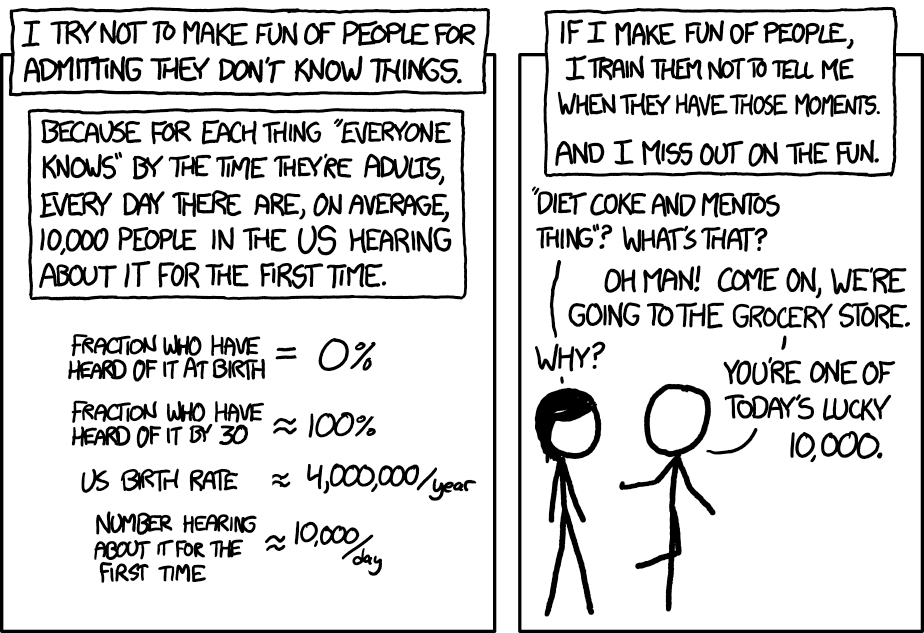- 4.79K Posts
- 3.41K Comments

 191·2 months ago
191·2 months ago
@Una@europe.pub for president!!!
Lol don’t feel bad, I can do advanced crazy shit with Linux like pivoting the running OS into RAM so I can unmount the boot drive to do whatever without ever rebooting
But I still [Web Search] commands a shit ton of the time LMAO

 10·2 months ago
10·2 months agoThey are a HilariousChaos user, long since tagged as a right-wing nut, that instance is the new right-wing “Lighter Friendlier” ExplodingHeads
Why? Your screenshot explains nothing lmao

 1·2 months ago
1·2 months agoCan confirm, I was able to save a post edit, TYSM!


 2·2 months ago
2·2 months agoI to am unable to edit any posts, but posting new is fine.
Seems to be a CloudFlare issue denying the post request, here’s a Ray ID for the admins if yall need to look it up in the dash 9823e4a2b845d8ce @MrKaplan@lemmy.world @lwadmin@lemmy.world
Making the 2 smaller ones not touch each other or one of the small ones not touching with the big one would do it

 11·2 months ago
11·2 months agoCool beans, tysm!
It was crossposted as part of .ml boycott efforts
Why am I cross-posting .ml content?
I cross-post from .ml to the nearest relevant non-.ml comm to reduce the influence of .ml comms and indirectly, the instance as a whole, to make it an easier decision for other instance admins to defederate because one key reason I identified that admins don’t want to defederate is because .ml still has some very large comms and some niche comms.
Some highlights from the link:
"Don’t worry guys, the Uyghur Genocide was REALLY just birth control! ~dessalines, .ml admin, dev https://lemmy.world/post/30580167
“See! nobody died IN Tiananmen Square, just AROUND it, so it doesn’t count!!” ~ Davel, .ml admin https://lemmy.world/post/30673342
.ml admin, Nutomics continued transphobia https://lemmy.world/post/29222558 The original transphobic Comment from Nutomic: https://lemmy.world/post/18236068
“NK is actually good and anything counter to that is Western propaganda!” ~dessalines, .ml admin, dev https://lemmy.world/post/31595035
General negative sentiment to other instances who haven’t “seen the way” yet ~davel, .ml admin https://lemmy.world/post/27426510
“If you don’t support Russia then you just don’t understand geopolitics” ~dessalines, .ml admin, dev https://lemmy.world/post/27352415
And so so much documentation on clear heavy handed censorship and bias also on the link. So much I can’t even put them all here because this comment would be really long.
I believe the behavior of its admins (the main admins are Lemmy devs) does harm to the overall growth of the Lemmy-verse and maybe even the Thrediverse (since Lemmy kinda kicked off the Thrediverse) because of its association with the devs of Lemmy and their insistence to use .ml as their personal political platform to spread harmful propaganda
On the outside, bringing up Lemmy frequently leads to comments like “Lemmy? Isn’t that the place with a bunch of tankies?” Or “Tried Lemmy, but found it full of pro Russia crap so I left”. The best way forward from that I see is to either widely defederate from .ml like the rest of the Triad, or pressure them to put a fair and unbiased as possible admin team.

 22·2 months ago
22·2 months agoYea, shouldn’t be a problem, most of the other comms are smaller, niche and slow. On top of that, I WFH so I’m generally always online or at least available to respond to notifications when awake lmao
Also, these 3 I regularly contribute to already

 121·2 months ago
121·2 months agoOh we finally got an actual conservative instance
HilariousChaos beat them to that, HC is basically a “Nicer Friendlier ExplodingHeads”
Though at least HC is a real instance and not some sort of manipulation attempt
far right communities being normalized.
Weird, that’s just the thing tankies label anyone and everything that calls them out or goes against them
Can’t imagine why they’d try to label a comm dedicated to the documentation of the authoritarianism ideology they push, the misinfo and propaganda they allow and the censorship they enforce though



 123·2 months ago
123·2 months ago.ml can get pretty vile you’re right, but don’t worry, the link goes to the megathread of the documentation of lemmy.mls extremist simping for authoritarian regimes like Russia and NK and the censorship it entails

 292·2 months ago
292·2 months agoLemmy.ml is a lot of things, but blind religious nuts is not one of em
I’ve had this user tagged as a religious nut for a long time, so I’m not surprised at all
Did you change accounts? My right-wing nut tag seems to have fallen off you
Don’t worry though, I’ve reattached it to its proper place
Guess they just don’t want to relate the to beings
Yea no, I don’t want any association with Star Trek and Charlie Kirk, thanks
















